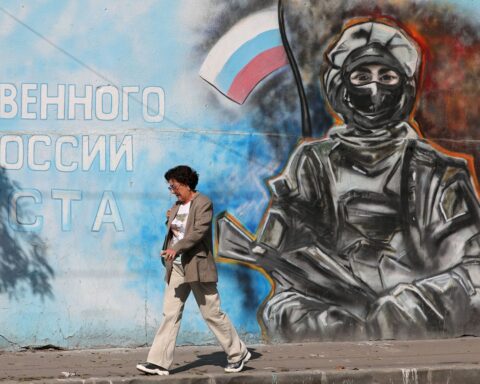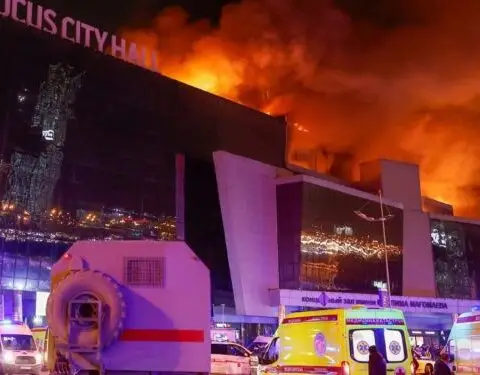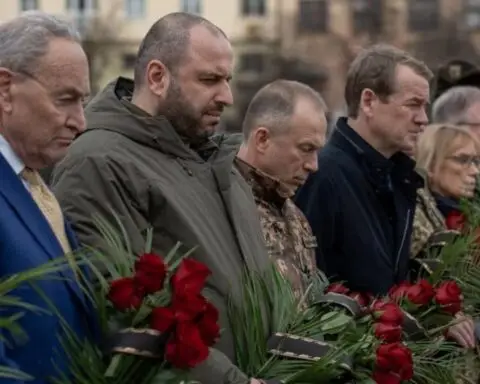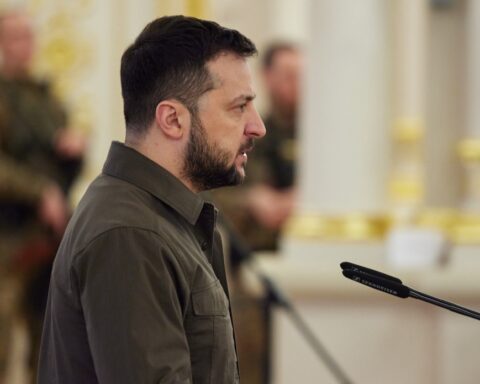Ukrainian defenders repelled more waves of Russian assaults on Bakhmut, the military said on March 29, as President Volodymyr Zelenskiy warned that Kyiv cannot afford not to win the battle for the eastern city that has become the focal point of Russia’s protracted offensive in the east.
“The enemy continued its assault on the city of Bakhmut,” Ukraine’s General Staff said in its daily report. “However, our defenders have been courageously holding on to the city, repelling numerous enemy attacks.”
Bakhmut, along with Avdiyivka, Mariynka, and Lyman remain the main targets of Russia’s relentless shelling, the Ukrainian military said, adding that a total of 57 enemy attacks were repelled over the past 24 hours in the area.
Russian troops also carried out 18 air strikes and three missile strikes, as well as 50 rocket salvoes along the whole front line over the previous day, the military said.
The information could not be independently verified.
Farther south, Russian forces kept shelling the Kherson region, the head of the regional military administration, Oleksandr Prokudin, said.
“Over the past day, the enemy has shelled the region 34 times — three times the city of Kherson itself,” Prokudin said on Telegram, adding that one person was wounded.
Residential buildings, a hospital, and a factory were among the Russian targets, Prokudin said.
East of Kherson, several simultaneous explosions rang out “in all areas” of Russian-occupied Melitopol, the exiled Ukrainian mayor of the city, Ivan Fedorov, said on March 29.
“The power went out in the northern and western districts of the city, as well as in Semenivka, Tambovka, and some other surrounding villages,” Fedorov said.
Russian media said the explosions were the result of shelling by Ukrainian forces. Kyiv has not commented on the report.
The strategic city, located some 120 kilometers southeast of the Zaporizhzhya nuclear power plant, was targeted by Ukrainian shelling in the past.
Meanwhile, Zelenskiy reaffirmed that Ukraine must hold on to Bakhmut at all costs, warning that a win by Russia there would be used by President Vladimir Putin as a stepping stone in garnering international support for a peace agreement that would force Ukraine to accept painful compromises.
Putin would “sell this victory to the West, to his society, to China, to Iran,” Zelenskiy told AP in an interview published on March 29. “If he will feel some blood — smell that we are weak — he will push, push, push,” he said.
Ukrainian military commanders have said their own counteroffensive is not far off, but in the meantime want to hold on to control of Bakhmut.
The Ukrainian military announced on March 28 that it has recently received long-promised Western equipment, including German Leopard 2 tanks.
On March 28, Zelenskiy said in his evening video address that the world must act with more urgency to put a stop to Russia’s aggression.
Zelenskiy used his evening video address to thank all who have followed the “call of their hearts” on behalf of Ukraine, adding that he believes the “Russian aggression can end much faster” than some have said. It will end faster “if the world is faster, if the world is more decisive,” he said late on March 28.
Zelenskiy laid out the reasons “to press and fight” and refuse to compromise even as Russian forces continue battling for control of Bakhmut. The reasons include the destroyed Ukrainian cities and villages, threats to destroy life in other countries, and Russia’s constant refusal to return to peace.
Zelenskiy spent March 28 on a working trip to the Sumy region in northeastern Ukraine. He presented the city of Okhtyrka with the award of hero city.
He also met with local authorities in the Sumy and Chernihiv regions and with commanders who are directly responsible for the protection of the two regions, which share a border with Russia.
In the eastern Donetsk region, Denis Pushilin, the administrator of the area controlled by Russian-backed separatists, spoke to Russian media about the situation in Bakhmut, saying most Ukrainian forces had pulled back from the AZOM metals factory on the western side of the Bakhmutka River in the city.






